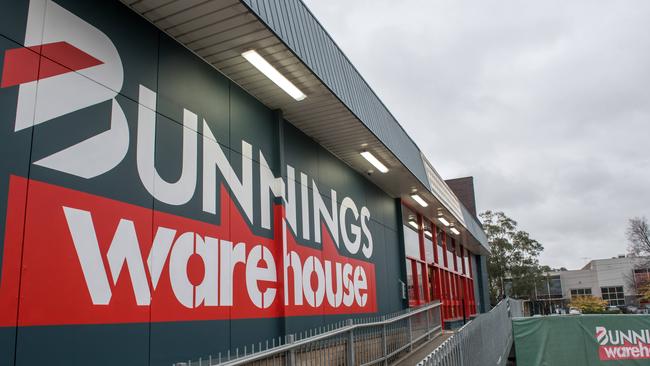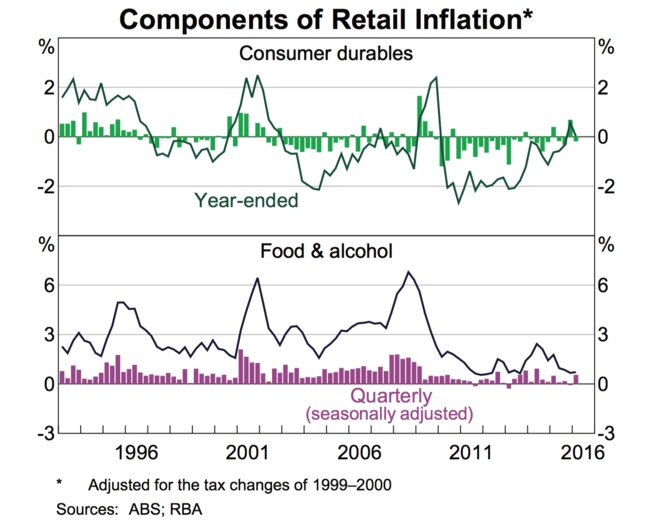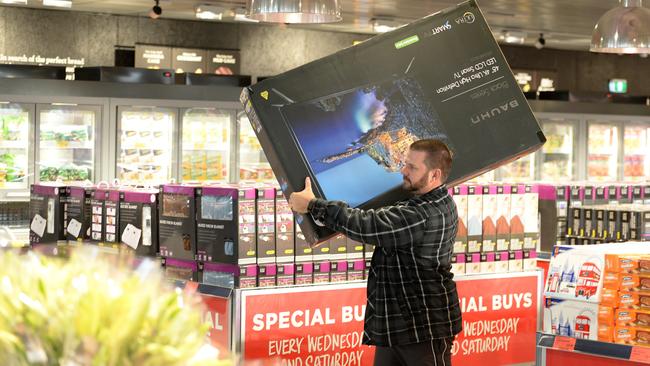Lower prices are just the beginning ... of a worrying trend
YES, shopping can be “too cheap”. And Bunnings isn’t the only one worried about Aldi’s low prices. The Reserve Bank is as well.

RETAIL prices have stayed low for a long time. So suspiciously low that the Reserve Bank of Australia (RBA) started to wonder if something had gone wrong.
It did a big investigation which it published last week. The reason they found? Mostly Aldi.
The RBA says we’ve had “a large downward shift in the average rate of retail inflation” that is not explained by labour costs or import costs. It blames technology (the internet) but also competition spurred by new foreign retailers.
Bunnings revealed just this week that even it worries about Aldi. Senior executives say they know lots of people will shop for tools at the discount supermarket, so Bunnings has to respond. Both companies are selling a drill for $89.99 this weekend, for example.

Aldi is not only lowering prices via direct competition — it is also showing other retailers just how badly Aussies want discounts. That is encouraging Coles and Woolies to slash prices too, even where Aldi is not a big threat.
Coles has cut its prices by 1.4 per cent this year even though market observers have warned an all-out price war would be bad for Coles, Woolworths and IGA.
The low level of retail inflation has been a major puzzle for the boffins at the Reserve Bank. They aim to keep inflation between 2 per cent and 3 per cent a year. But retail inflation has been below that.

Retailers have not been passing on the effect of the lower Aussie dollar.
When the Australian dollar started falling, back in 2012, everyone expected retail prices would start rising. A lower Aussie dollar makes imported goods more expensive, so it makes sense we’d see higher prices on the shelves. We waited and waited. But it never really happened.
So what’s happened? The RBA reports technology and foreign retailers have contributed to a climate of fear for Australian retailers. They are deeply worried about what will happen if they raise prices.
“In a number of market segments, liaison has attributed the increase in retail competition to the actions of a perceived ‘market leader’, which is generally looking to expand their market share, effectively increasing supply. This has led a number of retailers to report that they believe demand for their goods is very price sensitive, and fear that they will lose sales volumes if they increase prices,” the RBA report said.
Retailers don’t want to cut their margins too much, so they have been working very hard to remove the other costs of doing business.
That’s the Aldi specialty — they cut costs every way they can, like stacking things in the same pallets they arrived in and speeding up check out by not packing bags. Other supermarkets have been trying to achieve similar cost reductions with things like automated check-outs.

But all this can only go on for so long. The Aldi effect can’t cause low inflation forever.
Price rises can be constrained for a while but eventually retailers are running at international best practice — on the absolute bare bones — and then the changes in the basic price of goods should be revealed again. Retail inflation could snap back to normal.
That will be good news at the Reserve Bank — they get sleeplessness nights thinking about inflation. But for shoppers these happy days of prices going down down will be over — at Coles, at Woolies, and yes, even at Aldi.
Jason Murphy is an economist. He publishes the blog Thomas The Thinkengine. Follow Jason on Twitter @Jasemurphy





